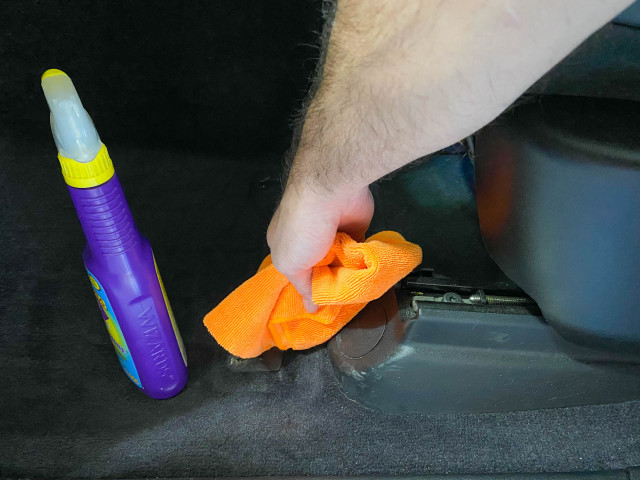How to clean your car interior

We do a lot of living inside our cars, and the end results are more than just stories to tell. Our interiors quickly show the rigors of commuting, errands and road trips. Dust, receipts and random French fries begin claiming too much of our personal space. It’s time to reclaim your interior with detailing, and these hints will help get better results. Here’s how to clean the inside of a car.
How often should you clean your car interior?
For some it’s therapeutic and for others it’s a necessary evil. Whichever end of the spectrum you fall on, cleaning the inside of your car is necessary maintenance that isn’t difficult to do. The hardest part is deciding to do it. Keeping the interior of your car clean not only helps maintain resale value, it makes it safer, last longer, smell better, and above all else, it creates a more pleasant driving—and idling—experience. Your mileage, and cleanliness may vary due to how many kids, pets, or passengers are in the car. After doing a deep clean following the steps you’ll see here, bi-weekly cleaning should be all it takes to keep your car’s interior clean and to make driving a more pleasant, happier experience.
Products required for car interior cleaning
Get set with glass cleaner, automotive carpet cleaner and lint-free rags or towels. Remember the ubiquitous leather and vinyl protectant products, but also grab things like cotton swabs, canned air, lens wipes and a toothbrush or a set of detailing brushes. Disposable nitrile gloves can be handy to minimize skin contact with the variety of cleaners.
How to clean your car’s interior like a pro
Interior car cleaning: 10 step-by-step instructions
Empty it. Yes, seriously. Take everything out of the vehicle. From floor mats to ice scrapers, tow ropes to emergency kit bags, child seats and kids’ toys, it’s surprising how much stuff is rolling around in the car. Everything needs to be removed from the vehicle to properly clean every crevice.
Once the vehicle is empty, it’s time to vacuum all the dirt, grime, and Goldfish crumbs out of all the nooks and crannies. Dust busters and hand-held vacuum cleaners aren’t ideal as they don’t have the suction power of a shop vac. Any shop vac with a few horsepower will do, along with attachments including a dusting brush, crevice tool, and floor brush. Start from the front and move top to bottom starting at the base of the A-pillars to the rear of the vehicle. Work your way around to the other side of the vehicle, moving always top to bottom. To get the bulk of the loose dust and crumbs, use the power of suction to vacuum the dashboard and center console with the dusting brush, but do not use this attachment on screens. Yes, vacuum the dash to suck up large dust particles or crumbs before wiping. It’s more efficient than the rag, which you’ll use on the next step. Be gentle with the vacuum, and never push down so as to not scratch or mar anything. This isn’t wiping, it’s sucking up dust and crumbs. Move on to the seats and use the crevice tool to get all the dirt, grime, and crumbs from the seat cracks. Use your fingers to gently pull apart the material near the seams while opening the crevice for the vacuum to get every last crumb. Before moving to the carpeted floor it’s important to move the front seats to their highest seating positions both forward and backward. This allows you to see every nook and cranny (a headlamp will help provide more light for those hard-to-see spots). Use the crevice tool to vacuum under and around the seat, seat tracks, and various plastic covers where grime and gunk like to form.
Move on to the carpet and floor mats. Vacuum thoroughly, including under the front seats. A portable automotive carpet shampooer may not be feasible for anyone who isn’t a dealer or detailer, but canned automotive carpet cleaner does a respectable job on the mats. Take particular care to refit the driver’s floor mat using its designed hooks or retention mounts. If cleaning the carpet as well, factor in extra time to air out the interior and allow it to dry. Use your vacuum’s floor brush to get the wide swaths of carpet. When vacuuming the back seat or rear cargo area on SUVs, minivans, or pickup trucks it’s important to move every seat into various positions and open up every storage cubby. Crumbs love to hide in these dark hidden spots.
Wipe it. Once all the crumbs and dirt are out of the car it’s time to clean and protect the plastics, vinyl, and leather bits of the vehicle’s interior. A clean microfiber rag and a cleaner or protectant with no sheen or sticky residue is all that’s necessary here. We’ll break this step down into different areas, since there’s a lot to cover.
Trim. Dust the dash, console and trim surrounds, but beware of using too much product in the car’s cockpit. That’s especially true for the dashboard, since too much shine can produce glare on the windshield while driving. And definitely avoid using protectant on pedals. Your feet can easily slip off them at precisely the wrong time.
Switches and controls. Good intentions can go awry here, as seemingly mild cleaners can smear the print and graphics painted on controls like turn signal and wiper stalks. Gauge cluster covers scratch very easily, and once it happens, you’ll notice it every time you look. For this you’ll want to avoid paper towels altogether. Gentle use of lens wipes gives better, damage-free results.
Vents. If it’s been a long time since the vehicle’s been cleaned there’s likely dust and gunk on the air vents. Canned air, cotton swabs and the toothbrush or detailing brushes can get the tight areas and work great to clean dust from air vents. Be gentle, as the vents are made of plastic bits that can break.
Seats. For leather, use a special cleaner/protectant from a major brand, with either a clean microfiber rag, leather sponge, or your own hands, but stop short of saturating them with product. If you have seats of cloth or another material, you can most likely stop after vacuuming them. Check your owner’s manual for recommendations to treat soiling, since even cleaning products made for fabric can stain car seats.
Cargo area. Trunk, hatch, whatever space you have to carry things, clean that too. The de facto trash and water bottle repository often has a more durable synthetic fiber on its surface than the passenger area, so light vacuuming usually does the trick to finish off detailing the interior.
Windows. Exterior glass rightfully gets attention, but the interior sides are too often ignored. Cleaning them will noticeably improve your vision, especially while driving at night. Be careful around back though. An errant swipe while cleaning can damage the rear defroster’s electrical connection point. To clean glass inside and out, a clean microfiber rag (or high-end paper towel in a pinch) with an ammonia-free glass cleaner such as Sprayaway Glass Cleaner or Stoner Glass Cleaner will leave windows streak-free and clear. Consult your owner’s manual for recommended cleaning, since some cars call for nothing harsher than mild soap and water on the delicate defroster grids.
Best way to clean a car interior with household items
A car’s interior can be cleaned with some basic household items, like a vacuum cleaner, cotton swabs, toothbrushes, canned air, lens or screen cleaning cloths, glass cleaners, and microfiber towels. Be wary of using any other household cleaning chemicals, though, as they may stain or damage surfaces.
Tips to clean a car interior
Get it from every angle. While cleaning, move things around to catch normally concealed areas you may not have known needed attention. Adjust seats forward and back, and up if possible, for better access beneath. Tilt the steering wheel fully up and down. Apply the parking brake and move the gearshift to clean their channels.
Use this as an opportunity to remove clutter and unnecessary items from your car. Once all the surfaces have been wiped clean it’s time to put mats and necessary items back into the vehicle. This is the time to take stock as to what really needs to be in the vehicle day-to-day. In the spring, ditch the snow scraper or stow it in a cargo hold or under a rear seat. It becomes an unnecessary projectile in the case of an accident in the spring, summer, and fall months.

How to clean your car’s interior like a pro
Frequently Asked Questions
What do they do in interior detailing?
Interior detailing is different than washing and waxing your car. A good interior detail or interior car wash thoroughly cleans the cabin of your car for a more enjoyable and healthier experience.
What is the best thing to clean the interior of a car?
Gentle, clean cloths and brushes will wipe away most debris, while you’ll want to use special cleaners for fabric and other surfaces. Don’t just go to the store and buy anything off the shelf. Products from 303, AMMO, Meguiar’s, Wizards, and Griot’s Garage do the best job without leaving greasy residue or harming the plastics or vinyl.
How do you clean the inside of a car seat?
If surface cleaning just isn’t enough for your car seats, consider steam cleaning them. A steam cleaner can remove trapped contaminants from deep in the seats, without using extra chemicals.
How do I make my car interior plastic look new?
First, wipe the plastic clean with cloths and brushes to get rid of all dust and accumulated debris. Some plastics may be revived with special interior detailing products, though any new product should be spot tested in an inconspicuous area to ensure it doesn’t stain or damage the surface.
What is the best thing to use to clean a car dashboard?
Wipe a car’s dashboard with a clean microfiber cloth, then use a small amount of protectant on the surface.
Does interior detailing remove stains?
That depends. Some fabric or other surface stains may be impossible to remove, though other times, an appropriate stain removal product may work. For extra assistance with stains, try a detailer that advertises steam clean car interior services.


